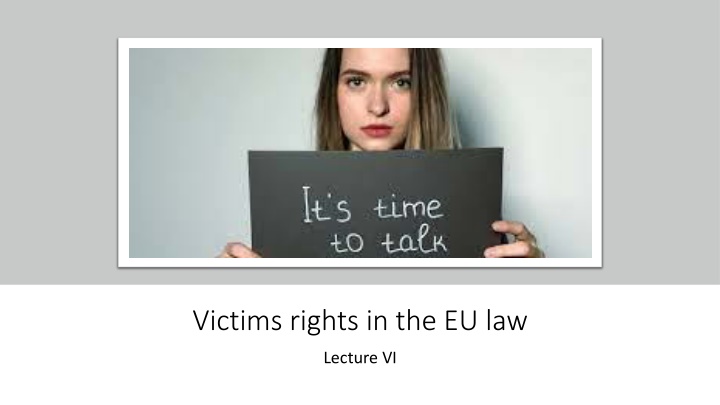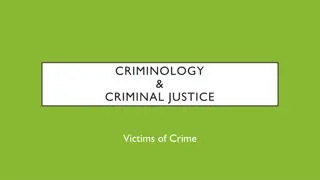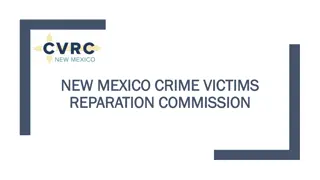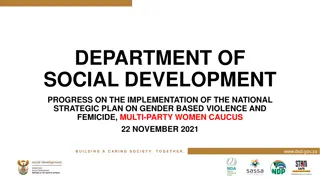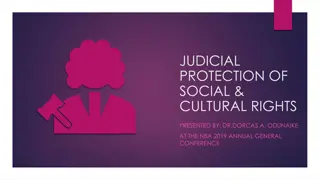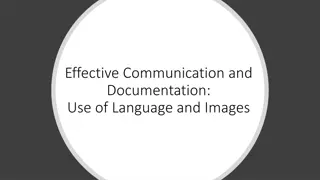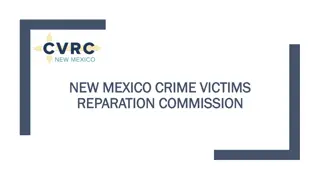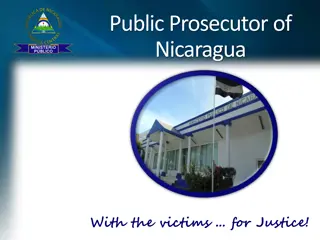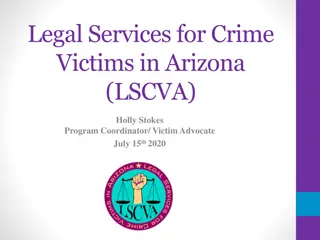Victims' Rights in EU Law and Importance of Victim Protection
Victims' rights are outlined in key legal acts in the EU, emphasizing minimum standards for the rights, support, and protection of crime victims. Understanding the definition of a victim, their importance as a source of information, the need for their involvement in proceedings, and the provision of necessary assistance are vital aspects of victim protection. EU law establishes rules to ensure the dignity and rights of victims are respected, contributing to mutual recognition of judgments and promoting victim-centric approaches in the criminal justice system.
Download Presentation

Please find below an Image/Link to download the presentation.
The content on the website is provided AS IS for your information and personal use only. It may not be sold, licensed, or shared on other websites without obtaining consent from the author.If you encounter any issues during the download, it is possible that the publisher has removed the file from their server.
You are allowed to download the files provided on this website for personal or commercial use, subject to the condition that they are used lawfully. All files are the property of their respective owners.
The content on the website is provided AS IS for your information and personal use only. It may not be sold, licensed, or shared on other websites without obtaining consent from the author.
E N D
Presentation Transcript
Victims rights in the EU law Lecture VI
Most important legal acts 1. Directive 2012/29/EU of the European Parliament and of the Council of 25 October 2012 establishing minimum standards on the rights, support and protection of victims of crime, and replacing Council Framework Decision 2001/220/JHA Directive 2011/36/EU of the European Parliament and of the Council of 5 April 2011 on preventing and combating trafficking in human beings and protecting its victims, and replacing Council Framework Decision 2002/629/JHA Directive 2011/92/EU of the European Parliament and of the Council of 13 December 2011 on combating the sexual abuse and sexual exploitation of children and child pornography, and replacing Council Framework Decision 2004/68/JHA Directive 2011/99/EU of the European Parliament and of the Council of 13 December 2011on the European protection order (EPO) Council Directive 2004/80/EC of 29 April 2004 relating to compensation to crime victims 2. 3. 4. 5.
Victim of a crime definitione - Article 2 of the directive 2012/29 Article 2 of the directive 2012/29 1. For the purposes of this Directive the following definitions shall apply: (a) victim means: (i) a natural person who has suffered harm, including physical, mental or emotional harm or economic loss which was directly caused by a criminal offence; (ii) family members of a person whose death was directly caused by a criminal offence and who have suffered harm as a result of that person's death. (b) family members means the spouse, the person who is living with the victim in a committed intimate relationship, in a joint household and on a stable and continuous basis, the relatives in direct line, the siblings and the dependants of the victim Legal persons (e.g. companies) can also be victims of crime. However, the EU law does not apply to legal persons.
1. The victim of a crime is an important source of information about the crime. 2. They should be heard in the proceedings and their statements taken into account. Why victim rights are important? 3. In case of some offences the victim decide on investigating and prosecuting an offence 4. Depending on the type of crime, the victim needs assistance (legal, psychological) and protection. It is about respecting the dignity of the victim. 5. From the perspective of EU law, minimum rules on the protection of the rights of victims of crime strengthen the principle of mutual recognition of judgments and inter alia the principle of free movement of persons. 6. Victimology has evolved to recognise the needs of the victim during the criminal justice process.
Restorative justice Restorative justice refers to an approach to justice that seeks to repair harm by providing an opportunity for those harmed and those who take responsibility for the harm to communicate about and address their needs in the aftermath of a crime. https://www.justice.gc.ca/eng/cj-jp/rj- jr/index.html#:~:text=Restorative%20justi ce%20refers%20to%20%E2%80%9Can,1
Restorative justice 5 rules Invite full participation and consensus. Give voice to those involved in and affected by a given incident of harm, and invite dialogue among them where appropriate. Outcomes decided upon must feel fair and reasonable to all those participating. Work towards healing what has been broken. A restorative response seeks to address the harms both tangible and intangible resulting from an incident, and to do what is possible to help meet the needs of any and all affected. Seek direct accountability. People causing harm should be held accountable for their actions to the people whom they have hurt. Appropriate reparation should be discussed and expected. Reintegrate where there has been division. Harmful actions often create outcasts, alienation, and distrust in the community and these actions may also be symptoms of such conditions. Where possible, restorative justice will help with reintegration and the repair of relationships. Strengthen the community and individuals to prevent further harms. Restorative justice is future-focused and asks the question: What needs to happen to reduce the chance of people being harmed again? In this way, the incident itself becomes a catalyst for efforts toward creating a healthier and safer organization or community.
Restorative justice Restorative Justice is a theory of justice that emphasizes repairing the harm caused by criminal behavior. It is best accomplished through cooperative processes that allow all willing stakeholders approaches are available when that is impossible. The foundational principles of restorative justice have been summarized as follows: to meet, although other - Crime causes harm and justice should focus on repairing that harm. - The people most affected by the crime should be able to participate in its resolution. - The responsibility of the government is to maintain order and of the community to build peace. http://restorativejustice.org
Secondary victimisation Secondary victimisation occurs when the victim suffers further harm not as a direct result of the criminal act but due to the manner in which institutions and other individuals deal with the victim. Secondary victimisation may be caused, for instance, by repeated exposure of the victim to the perpetrator, repeated interrogation about the same facts, the use of inappropriate language or insensitive comments made by all those who come into contact with victims. What are examples of secondary victimisation?
Victim rigths in the EU law 1. the right to information 2. the right to support 3. the right to participate in the proceedings 4. the right to be heard 5. the right to protection The criminal process must also be fair to the victim of the crime. There are no mandatory rules under EU law on how this fairness must be ensured. The provisions of the directives are quite general and the states have a significant margin of appreciation in the implementation of the provisions.
Right to information minimum scope of the letter of rights (article 4) (a) the type of support they can obtain and from whom, including, where relevant, basic information about access to medical support, any specialist support, including psychological support, and alternative accommodation; (b) the procedures for making complaints with regard to a criminal offence and their role in connection with such procedures; (c) how and under what conditions they can obtain protection, including protection measures; (d) how and under what conditions they can access legal advice, legal aid and any other sort of advice; (e) how and under what conditions they can access compensation; (f) how and under what conditions they are entitled to interpretation and translation; see article 7 of the directive 2012/29 (g) if they are resident in a Member State other than that where the criminal offence was committed, any special measures, procedures or arrangements, which are available to protect their interests in the Member State where the first contact with the competent authority is made; (h) the available procedures for making complaints where their rights are not respected by the competent authority operating within the context of criminal proceedings; (i) the contact details for communications about their case; (j) the available restorative justice services; (k) how and under what conditions expenses incurred as a result of their participation in the criminal proceedings can be reimbursed.
Right to information article 6 Right to receive information about their case 1. Member States shall ensure that victims are notified without unnecessary delay of their right to receive the following information about the criminal proceedings instituted as a result of the complaint with regard to a criminal offence suffered by the victim and that, upon request, they receive such information: (a) any decision not to proceed with or to end an investigation or not to prosecute the offender; (b) the time and place of the trial, and the nature of the charges against the offender. 2. Member States shall ensure that, in accordance with their role in the relevant criminal justice system, victims are notified without unnecessary delay of their right to receive the following information about the criminal proceedings instituted as a result of the complaint with regard to a criminal offence suffered by them and that, upon request, they receive such information: (a) any final judgment in a trial; (b) information enabling the victim to know about the state of the criminal proceedings, unless in exceptional cases the proper handling of the case may be adversely affected by such notification.
Right to information article 6 Right to receive information about their case 5. Member States shall ensure that victims are offered the opportunity to be notified, without unnecessary delay, when the person remanded in custody, prosecuted or sentenced for criminal offences concerning them is released from or has escaped detention. Furthermore, Member States shall ensure that victims are informed of any relevant measures issued for their protection in case of release or escape of the offender. 6. Victims shall, upon request, receive the information provided for in paragraph 5 at least in cases where there is a danger or an identified risk of harm to them, unless there is an identified risk of harm to the offender which would result from the notification.
The right to support Two types of support: During the criminal proceedings/during the trial Outside the trial e.g. pschological support
1. Member States shall ensure that victims, in accordance with their needs, have access to confidential victim support services, free of charge, acting in the interests of the victims before, during and for an appropriate proceedings. Family members shall have access to victim support services in accordance with their needs and the degree of harm suffered as a result of the criminal offence committed against the victim. 3. Member States shall take measures to establish free of charge and confidential specialist support services in addition to, or as an integrated part of, general victim support services, or to enable victim support organisations to call on existing specialised entities providing such specialist support. Victims, in accordance with their specific needs, shall have access to such services and family members shall have access in accordance with their specific needs and the degree of harm suffered as a result of the criminal offence committed against the victim. 4. Victim support services and any specialist support services may be set up as public or non- governmental organisations and may be organised on a professional or voluntary basis. The right to support article 8 time after criminal
1. Article 8(1), shall, as a minimum, provide: (a) information, advice and support relevant to the rights of victims including on accessing national compensation schemes for criminal injuries, and on their role in criminal proceedings including preparation for attendance at the trial; (b) information about or direct referral to any relevant specialist support services in place; (c) emotional and, where available, psychological support; (d) advice relating to financial and practical issues arising from the crime; (e) unless otherwise provided by other public or private services, advice relating to the risk and prevention of secondary and repeat victimisation, of intimidation and of retaliation. Victim support services, as referred to in The right to support article 9
3. Unless otherwise provided by other public or private services, specialist support services referred to in Article 8(3), shall, as a minimum, develop and provide: (a) shelters or any other appropriate interim accommodation for victims in need of a safe place due to an imminent risk of secondary and repeat victimisation, of intimidation and of retaliation; (b) targeted and integrated support for victims with specific needs, such as victims of sexual violence, victims of gender-based violence and victims of violence in close relationships, including trauma support and counselling. The right to support article 9
The right to participate in criminal proceedings Two forms of participation: Active participation call evidence, rigth to appeal; the scope of active participation of a victim depends on national law and national regulation. The drective 2012/29 refers only to the right to be heard as a form of active participation passive participation rigth to be present and observe the criminal tria/criminal proceedings
The right to participate in criminal proceedings Right to be heard article 10 Rights in the event of a decision not to prosecute (right to review a decision not to prosecute) article 11 Right to safeguards in the context of restorative justice services article 12 Right to legal aid article 13 Right to reimbursement of expenses article 14 Right to the return of property article 15 Right to decision on compensation from the offender in the course of criminal proceedings article 16 Article 17 cross-border rights of the victim
The right to be heard Article 10 Right to be heard 1. Member States shall ensure that victims may be heard during criminal proceedings and may provide evidence. Where a child victim is to be heard, due account shall be taken of the child's age and maturity. 2. The procedural rules under which victims may be heard during criminal proceedings and may provide evidence shall be determined by national law.
Recital 53 The risk of secondary and repeat victimisation, of intimidation and of retaliation by the offender or as a result of participation in criminal proceedings should be limited by carrying out proceedings in a coordinated and respectful manner, enabling victims to establish trust in authorities. Interaction with competent authorities should be as easy as possible whilst limiting the number of unnecessary interactions the victim has with them through, for example, video recording of interviews and allowing its use in court proceedings. As wide a range of measures as possible should be made available to practitioners to prevent distress to the victim during court proceedings in particular as a result of visual contact with the offender, his or her family, associates or members of the public. To that end, Member States should be encouraged to introduce, especially in relation to court buildings and police stations, feasible and practical measures enabling the facilities to include amenities such as separate entrances and waiting areas for victims. In addition, Member States should, to the extent possible, plan the criminal proceedings so that contacts between victims and their family members and offenders are avoided, such as by summoning victims and offenders to hearings at different times. The right to protection
(54) Protecting the privacy of the victim can be an important means of preventing secondary and repeat victimisation, intimidation and retaliation and can be achieved through a range of measures including non-disclosure or limitations on the disclosure of information concerning the identity and whereabouts of the victim. Such protection is particularly important for child victims, and includes non- disclosure of the name of the child. However, there might be cases where, exceptionally, the child can benefit from the disclosure or even widespread publication of information, for example where a child has been abducted. Measures to protect the privacy and images of victims and of their family members should always be consistent with the right to a fair trial and freedom of expression, as recognised in Articles 6 and 10, respectively, of the European Convention for the Protection of Human Rights and Fundamental Freedoms. (55) Some victims are particularly at risk of secondary and repeat victimisation, of intimidation and of retaliation by the offender during criminal proceedings. It is possible that such a risk derives from the personal characteristics of the victim or the type, nature or circumstances of the crime. Only through individual assessments, carried out at the earliest opportunity, can such a risk be effectively identified. Such assessments should be carried out for all victims to determine whether they are at risk of secondary and repeat victimisation, of intimidation and of retaliation and what special protection measures they require. The right to protection
(56) Individual assessments should take into account the personal characteristics of the victim such as his or her age, gender and gender identity or expression, ethnicity, race, religion, sexual orientation, health, disability, residence status, communication difficulties, relationship to or dependence on the offender and previous experience of crime. They should also take into account the type or nature and the circumstances of the crime such as whether it is a hate crime, a bias crime or a crime committed with a discriminatory motive, sexual violence, violence in a close relationship, whether the offender was in a position of control, whether the victim's residence is in a high crime or gang dominated area, or whether the victim's country of origin is not the Member State where the crime was committed. The right to protection
(57) Victims of human trafficking, terrorism, organised crime, violence in close relationships, sexual violence or exploitation, gender-based violence, hate crime, and victims with disabilities and child victims tend to experience a high rate of secondary and repeat victimisation, of intimidation and of retaliation. Particular care should be taken when assessing whether such victims are at risk of such victimisation, intimidation and of retaliation and there should be a strong presumption that those victims will benefit from special protection measures. (58) Victims who have been identified as vulnerable to secondary and repeat victimisation, to intimidation and to retaliation should be offered appropriate measures to protect them during criminal proceedings. The exact nature of such measures should be determined through the individual assessment, taking into account the wish of the victim. The extent of any such measure should be determined without prejudice to the rights of the defence and in accordance with rules of judicial discretion. The victims' concerns and fears in relation to proceedings should be a key factor in determining whether they need any particular measure. The right to protection
The right to protection - Article 20 Right to protection of victims during criminal investigations Without prejudice to the rights of the defence and in accordance with rules of judicial discretion, Member States shall ensure that during criminal investigations: (a) interviews of victims are conducted without unjustified delay after the complaint with regard to a criminal offence has been made to the competent authority; (b) the number of interviews of victims is kept to a minimum and interviews are carried out only where strictly necessary for the purposes of the criminal investigation; (c) victims may be accompanied by their legal representative and a person of their choice, unless a reasoned decision has been made to the contrary; (d) medical examinations are kept to a minimum and are carried out only where strictly necessary for the purposes of the criminal proceedings.
The right to protection - Article 22 Individual assessment of victims to identify specific protection needs 1. Member States shall ensure that victims receive a timely and individual assessment, in accordance with national procedures, to identify specific protection needs and to determine whether and to what extent they would benefit from special measures in the course of criminal proceedings, as provided for under Articles 23 and 24, due to their particular vulnerability to secondary and repeat victimisation, to intimidation and to retaliation. 2. The individual assessment shall, in particular, take into account: (a) the personal characteristics of the victim; (b) the type or nature of the crime; and (c) the circumstances of the crime. 3. In the context of the individual assessment, particular attention shall be paid to victims who have suffered considerable harm due to the severity of the crime; victims who have suffered a crime committed with a bias or discriminatory motive which could, in particular, be related to their personal characteristics; victims whose relationship to and dependence on the offender make them particularly vulnerable. In this regard, victims of terrorism, organised crime, human trafficking, gender-based violence, violence in a close relationship, sexual violence, exploitation or hate crime, and victims with disabilities shall be duly considered.
The right to protection - Article 23 Right to protection of victims with specific protection needs during criminal proceedings The following measures shall be available during criminal investigations to victims with specific protection needs identified in accordance with Article 22(1): (a) interviews with the victim being carried out in premises designed or adapted for that purpose; (b) interviews with the victim being carried out by or through professionals trained for that purpose; (c) all interviews with the victim being conducted by the same persons unless this is contrary to the good administration of justice; (d) all interviews with victims of sexual violence, gender- based violence or violence in close relationships, unless conducted by a prosecutor or a judge, being conducted by a person of the same sex as the victim, if the victim so wishes, provided that the course of the criminal proceedings will not be prejudiced.
The right to protection - Article 23 Right to protection of victims with specific protection needs during criminal proceedings 3. The following measures shall be available for victims with specific protection needs identified in accordance with Article 22(1) during court proceedings: (a) measures to avoid visual contact between victims and offenders including during the giving of evidence, by appropriate means including the use of communication technology; (b) measures to ensure that the victim may be heard in the courtroom without being present, in particular through the use of appropriate communication technology; (c) measures to avoid unnecessary questioning concerning the victim's private life not related to the criminal offence; and (d) measures allowing a hearing to take place without the presence of the public.
Victims rights in the context of rights of the accused A criminal trial must be fair to the accused and the victim. The question arises - how to ensure this fairness? The interests of the accused and the victim are in opposition to each other. Whose interest is more important in criminal proceedings?
Victims rights in the context of rights of the accused A. Klip believes that Directive 2012/29 is biased and grants more rights to the victim at the detriment of the rights of the accused. The interests of the participants in the proceedings have not been properly balanced. The assumption that the victim is the victim is also problematic. The question is weather or not this may violate the presumption of innocence of the accused and affect the fairness of the proceedings, as the accused will be confronted with an additional accuser on top of prosecution. Nowhere in the Directve is it reflected that an aleged victim might not be (the) victim of the accused . A. Klip, European Criminal Law, p. 332
Right to compensation COUNCIL DIRECTIVE 2004/80/EC of 29 April 2004 relating to compensation to crime victims Community law guarantees to a natural person the freedom to go to another Member State, the protection of that person from harm in the Member State in question, on the same basis as that of nationals and persons residing there, is a corollary of that freedom of movement. Measures to facilitate compensation to victims of crimes should form part of the realisation of this objective . Crime victims in the European Union should be entitled to fair and appropriate compensation for the injuries they have suffered, regardless of where in the European Community the crime was committed
Right to compensation Compensation to crime victims Directive sets up a system of cooperation to facilitate access to compensation to victims of crimes in cross-border situations, which should operate on the basis of Member States' schemes on compensation to victims of violent intentional crime, committed in their respective territories. Therefore, a compensation mechanism should be in place in all Member States. https://eur-lex.europa.eu/legal- content/EN/TXT/?uri=celex:32004L0 080
Article 1 Right to compensation Member States shall ensure that where a violent intentional crime has been committed in a Member State other than the Member State where the applicant for compensation is habi-tually resident, the applicant shall have the right to submit the application to an authority or any other body in the latter Member State. Article 2 Compensation shall be paid by the competent authority of the Member State on whose territory the crime was committed.
Article 3 Right to compensation Member States shall establish or designate one or several authorities or any other bodies - assisting authority or authorities the role is to provide information for the victims and in case of transnational case - forward applications abroad to respective authorities of another Member State Member States shall establish or designate one or several authorities or any other bodies to be responsible for deciding upon applications for compensation - deciding authority or authorities . https://e- justice.europa.eu/content_compensation _to_crime_victims-448-es- en.do?member=1
The system should ensure that crime victims could always turn to an authority in their Member State of residence and should ease any practical and linguistic difficulties that occur in a cross-border situation. Right to compensation In Poland e.g. you can address yourself to the district prosecutor who serves as assisting authority. His/her role is to advise and forward application to the competent authority in other Member State.
